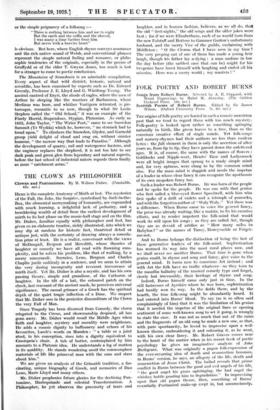THE CLOWN AS PHILOSOPHER
Clowns and Pantomimes. By M. Willson Disher. (Constable. 42s. net.) HERE is the complete Anatomy of Mirth at last. The mysteries of the Fall, the Joke, the Surprise, symbolized by Jack-in-the- Box, the elemental merrymaking of humanity, are expounded with much learning, a delightful lack of pedantry, and a bewildering wealth of detail from the earliest development of mirth to its last phase on the music-hall stage and on the film. Mr. Disher, familiar equally with philosopher and fool, has given us an elaborate treatise, richly illustrated, into which we may dip at random for historic fact, theatrical detail or antique jest, with the certainty of drawing always a consola- tion prize at least. He is a realist, conversant with the views of McDougall, Bergson and Meredith, whose theories of laughter or comedy we have all read with frowning com- plexity, and he solves his problem, like that of walking, by a merry somersault. Socrates, Leno, Bergson and Charles Chaplin jostle suddenly in a sentence, and we seem to attain the very daring incongruity and reverent irreverence of mirth itself. Yet Mr. Disher is also a mystic, and has his own passing theory, simple and grandiose, of the Catharsis of laughter. In the tilt of a hat, the coloured patch on the cheek, last remnant of the ancient mask, he perceives universal significance. The casual grimace of a Grock has the spiritual depth of the quiet tragic inflection of a Duse. We suspect that Mr. Disher sees in the posterior discomfiture of the Clown the very Fall of Man.
Since Tragedy has been divorced from Comedy, the clown relegated to the Circus, and showmanship despised, all has gone awry. Mr. Disher would recall the Middle Ages when faith and laughter, mystery and morality were neighbours. He adds a cosmic dignity to buffoonery and echoes of his favourites, Lamb's words on Munden : " a table or a joint stool, in his conception, rises into a dignity equivalent to -Cassiopeia's chair. A tub of butter, contemplated by him amounts to a Platonic idea. He understands a leg of mutton in its quiddity. He stands wondering amid the commonplace materials of life like primeval man with the suns and stars about him."
We are given an analysis of the Grimaldi tradition, a fas- cinating, unique biography of Grock, and memories of Dan Leno, Marie Lloyd and many others.
Mr. Disher prophesies future glories for the declining Pan- tomime, Harlequinade and celestial Transformation. A Philosopher, he yet observes the proximity of tears and laughter, and in human fashion, believes, as we all do, that the old first-nights," the old songs arid- the older jokes were best ; for if we were Elizabethans, each of us would turn from the new Falstaff and Bottom to Gammer Gorton's unfortunate husband, and the merry Vice of the guilds, exclaiming with Middleton : " 0 the Clowns that I have seen in my time ! The very peeping out of one of them has made a young heir laugh, though his father lay a-dying : a man undone in law the day before (the saddest case that can be) might for his twopence have burst himself with laughing and ended all his miseries. Here was a merry world ; my masters ! "










































 Previous page
Previous page